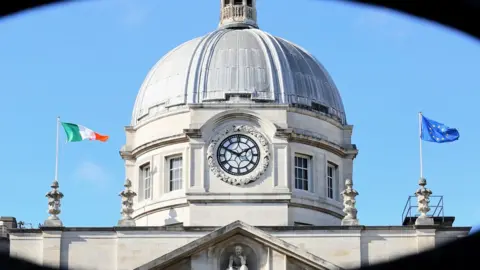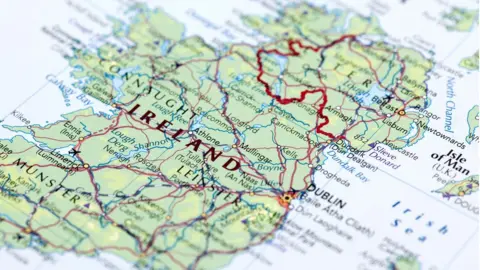Ireland and the EU: A special case
 PAUL FAITH
PAUL FAITHWhile the UK and the Republic of Ireland may be at odds over Brexit now, back in 1973 things were very different (they had both voted to join the EU, then the European Economic Community).
Unlike the other 27 members though, the Republic of Ireland has always been a special case.
But that's not just because of the border it shares with Northern Ireland.
Irish citizens hold a trump card when it comes to whether the EU can implement some big laws.
What is the 'trump card'?
EU policy and actions are decided through treaties - binding agreements between EU member countries that set out rules and objectives for decision-making.
They have to be approved by all 28 EU members before they can take effect.
In 27 states it is the governments that approve the treaties - but in the Republic of Ireland the laws have to be put to a referendum, where citizens get to vote on whether or not to implement the law.
If a majority of Irish citizens vote against the treaty in the referendum, that means it can't take effect in any EU member state at all.
So why is the Republic of Ireland different?
 Getty Images
Getty ImagesIt all comes down to Irish history, and the country's unique constitution, says Conor O'Mahony, a senior lecturer at University College Cork.
The Irish constitution, which came into force in 1937 and replaced the 1922 constitution of the Irish Free State, made clear that "no other legislative authority has power to make laws for the state" or infringe upon the state's new-found sovereignty.
Any changes to it require citizens to approve amendments by way of a referendum.
O'Mahony says that was directed towards Westminster, primarily, as well as the Republic of Ireland's desire to promote democratic participation.
But, when it joined the EU, that meant signing Ireland up to new laws and measures from the European Parliament.
The Irish constitution was amended to reflect the country's fresh ties to the EU, and the government hoped that would negate the need for any future referendums relating to EU matters.
But it didn't?
No.
In 1987, a landmark court case - Crotty v An Taoiseach - ruled that any significant EU laws could not be ratified without first having been approved in a referendum in the Republic of Ireland.
At the time, the EU was trying to implement the Single European Act (SEA).
O'Mahony explains: "What it all hinged on, was that certain measures the Irish government had signed up to involved giving away aspects of sovereignty, such as giving the EU more control on issues around foreign relations.
"What the Supreme Court said in the Crotty judgement was because the SEA was an encroachment on sovereignty not there in a previous EU treaty, the Treaty of Rome, it would need a fresh referendum."
That case set a precedent and with each subsequent EU treaty, there has been a referendum held on it in the Republic of Ireland.
How is that viewed by the other EU states?
It can be awkward, says Conor O'Mahony.
"In all of these cases the rest of Europe had to stand and wait while we had a referendum.
"There is sometimes a sense when you try to explain it to people in other countries of: 'Why do 300 million people have to wait for votes of a million people'?"
But the power to have the referendum can also have consequences and cause chaos across the EU.
In two instances in recent years, Irish citizens voted against EU treaties in two referendums: the Nice Treaty in 2001 and the Lisbon Treaty in 2008.
It took a second referendum in both cases before the EU could ratify and implement the treaties.
O'Mahony says as Irish referendums are successful or defeated based on a simple majority, there can be situations where a referendum could defeated by just a few thousand votes.
"Other EU members do sometimes struggle to figure out why such a small number of people get to make a decision on something so huge," he adds.
"On the other side it begs the question, how can you have an electorate making a fully informed decision on something so complicated?"
What does that mean for Irish citizens, having to vote more often?
That depends on who you ask.
Only a small fraction of amendments to the Irish constitution relate to the EU, with other topics including more high-profile issues such as legalising same-sex marriage, abortion and most recently, a vote to overturn a law on blasphemy generating widespread attention.
Conor O'Mahony says people have become accustomed to having their say.
"If the government was to go ahead and sign up to a new treaty, wanted to proceed without a referendum - there would be a certain amount of human pride, saying: "Hold on, don't we get a vote on this?"
But he accepts it might only be more informed citizens arguing to get a vote on legally tricky EU matters.
"It's incredibly difficult to hold a referendum on something as complicated as EU issues," he adds, pointing out that turnout in previous EU treaty referendums has been low - the first referendum on the Nice Treaty saw a turnout of just 34%.
Does Ireland's 'trump card' on EU issues tie into Brexit at all?
The Irish government has taken centre stage in the Brexit negotiations, in its demands on the NI border backstop - the insurance policy arrangement to ensure a frictionless border after Brexit.
There have been calls by UK politicians for it to be ditched, as if it took effect, it would see the UK staying in the backstop until the EU agreed it was no longer necessary.
So does the referendum power Ireland has on certain EU votes, mean it has more sway over the EU on Brexit too?
Not really, says Conor O'Mahony.
"It could have an impact only if the EU was going to do something that went outside our treaty agreements, if the EU was taking some power it already didn't have.
"I don't think the EU would go engaging in a way with the UK that all EU treaties would need amended, and then voted in by Ireland."
That being said, the Republic of Ireland holds a powerful position within the EU - something officials in Brussels remain mindful of, as the countdown to Brexit ticks ever closer.
